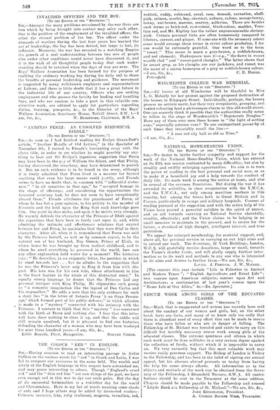" ANTONIO PEREZ : AN UNSOLVED HISTORICAL RIDDLE."
[To THE EDITOR OF THE " SPECTATOR."] Sin,—As soon as I had finished reading Sir Evelyn Grant-Duff's article, " Another Bundle of Old Letters," in the Spectator of Noveniber 9th, I turned to Froude's fascinating essay with the above title, in order to see whether he might possibly 'say any- thing to bear out Sir Evelyn's ingenious suggestion that Perez may have been in the pay of William the Silent, and that Philip, having discovered the treachery, may have determined to punish it. But no such evidence is to be found in the essay, although it is freely admitted that Perez lived in a manner far beyond anything that even his large means could justify, and Froude seems to have no doubt that, in common with " influential states- men " " in all countries in that age," he " accepted homage in the shape of offerings; and considering the opportunities the favoured secretary had, lie does not seem to have exceptionally abused them." Froude attributes the punishment of Perez, of u-hosa he has but a poor opinion, to his privity to the murder of Eseovedo and the hold upon the King that such knowledge gave him. One point he does make, and upon it he insists very strongly. He warmly defends the character of the Princess of Eboli against the aspersions that have been so freely cast upon it, and, while admitting the intimate and affectionate relations that existe.I between her and Perez, he maintains that they were filial in their character. After all, when it is remembered that Perez was said by the Princess herself, as well as by common report, to be the natural son of her husband, Ruy Gomez, Prince of Eboli, in whose house he was brought up from earliest childhood, and to whom he owed everything he possessed in the world, how can any other explanation hold water for a moment? The historian rays : " He describes, in an enigmatic letter, the position in which he stood towards her . . . but he alludes to the suggestion that he was the Princess's lover only to fling it from him with dis- gust. His love was for his own wife, whose attachment to him is the finest feature in the whole of this distracted story." In equally strong language he denies that the Princess had any personal intrigue with King Philip. He stigmatizes such gossip " a romantic imagination like the legend of Don Carlos and his stepmother." He adds a note that the only evidence for such a story lies " in the letter of Antonio Perez h un Gran Person- age,' which formed part of his public defence," in which allusion is made to a "mystery " connected with his intimacy with the Princess. I venture to think that this "mystery " was concerned with the birth of Perez. and nothing else. 1 fear that this letter will have done nothing to clear it up, and that the riddle will still remain unsolved, but it is pleasant to find one historian defending the character of a woman who may have been traduced for over three hundred years.—I am, Sir, &c., Little Bounds, Fleet, Hampshire. SI EPBEN SIMEON.


































 Previous page
Previous page